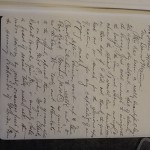Yun Ch’i Ho was an extraordinary figure and Emory’s first international student. In Korea, he was an influential political leader as well as a Christian missionary. Through his diaries, we are able to first hand experience what he went through in Oxford, Georgia. At the beginning of most of his diary entries, he described the weather and the emotions associated with it, positive and negative. In some of his entries, he even wrote the actual temperature and converted it from Fahrenheit to Celsius showing the math. Yun Ch’i Ho seemed to be greatly influenced by his emotions due to his description of the weather as he described one day on January 31, 1892 as “just cold enough to invigorate the body; the Sun just warm enough to cheer the spirit”. He also seemed to have a great appreciation for nature as on the same day he as he “thank[ed] the great God so much for the glorious aspect of nature as for my capability of enjoying such”. On the other hands, some bad day such as March 18, 1892, he described as “bitter cold-strong northwest- flakes of snow-frowning sky”. He also seemed very precise due to his accurate mathematical calculations at the top of the page.
During his time at Emory, he was close to Warren A. Candler, the president of Emory at the time. Yun stated “The best part of my life has been guided and directed under the providence of God, by Emory men”. He saw Emory men as superior and sometimes blamed his culture for how he was treated in society. During this time in the 19th century, race was mainly just white or black and Yun Ch’i Ho felt like he did not fit in. During his time at Emory, he came with hopes of gaining a valuable education in America while doing missionary work. But this discrimination he felt was always with him through his time at Emory.
Early on at the university, he seemed to grow fond of various women. On January 26, 1892, he stated in his diary “my dearest Mauria. I love you so much”. But the next on February 17, 1892, he seemed to address a new girl, Laurie, with “dear”. He used to go to the Candler’s for dinner frequently, and in that same entry, he describes the girl’s movements as “their graceful movements, polite and orderly behavior at the table”. On April 18, 1891, Yun noted, “if there are some things in America that [he] envied more than others, they are, first its beautiful women”. Yun seemed to be a very emotional person and seemed to be very moved by women. Yun thought that he would have no chance with any of the white women at Emory because none of them would even consider marrying him due to his race.
Yun developed a good relation with Nettie Candler, the wife of Warren Candler. On March 15, 1892, they went to a YMCA convention in Griffin, GA that had a “population of between 9 or 10 thousand [and] hospitable people”. After the convention, Mrs. Candler said he could have gotten a sweetheart in Griffin if he had stayed longer. But Yun Ch’i Ho feeling sorry for himself because of his background took that as “even if you stayed long, who would have you for a sweetheart—you a Corean!” He felt “humiliation, mortification, insult and despair are the condition or fees for being a Cor!” Even though Yun was such an influential individual in Korea, he seemed to be feel discrimination tremendously in America. Yun was a brave individual and initiated the revolutionary trend of international students coming to Emory.
[1] Romance and Race in the Jim Crow South: Yun Ch’i-ho and the Personal Politics of Christian Reform by Andrew Urban
[2] Yun Ch’i Ho’s personal diaries from 1891-1892
[3] http://www.emory.edu/EMORY_MAGAZINE/spring2004/korean.html





